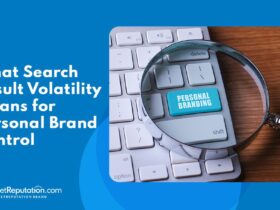This article about how to delete my information online discusses ways to remove personal details from data broker websites, search engines, social media accounts and more.
Today, your online presence can have a significant impact on your personal and professional lives. Negative search results and misleading public records can damage your brand’s online reputation, affect your job prospects, and even influence your personal relationships.
If you’re worried about the personally identifiable information that’s available about you online — on data broker sites, social media platforms, and more — you’re probably wondering how to delete that personal information from the internet.
In this article, we’ll go over the different methods and strategies you can use for removing personal information from the internet or influencing Google search results so it’s rarely found.
We offer ORM solutions for individuals as well as businesses. Get started today with a free consultation with one of our experts. Call us at 844-461-3632 or fill out the contact form below.
Request a Free Consultation
Understand Your Online Presence
The first step to removing your personal information from the internet is understanding what’s out there about you. By conducting an online audit and identifying the most problematic results, you’ll be off to a strong start.
It’s smart to keep a running log of your findings on a spreadsheet. Otherwise, you’ll end up going back to the negative content over and over, which will signal to Google that it’s important information. This could make it even harder to get rid of the data once you’re in the removal stage.
Conduct an Online Audit
Use search engines — Bing, DuckDuckGo, Google, etc. — to search for your name. Additionally, search for:
- Variations of your name
- Email addresses
- Phone numbers
- User names from online accounts
- Any other personal information that may be online about you
Also, look at various social platforms, whether or not you have have social media accounts on them. It’s possible that there’s personal information about you on a social media site without you even realizing it.
Dig deeper into professional networking platforms like LinkedIn to find personal info or sensitive data about you, including outdated or incorrect information.
Next, check out review platforms like Tripadvisor and Yelp to find feedback about your business. And lastly, search blogs, forums (like Reddit) and news sites for personal information about you that may not have shown up prominently in Google Search.
Identify the Content That’s Problematic
A lot of information from the internet that you find won’t be concerning. For example, personal information that you post on social media or business information on data broker sites may be fine to leave alone.
Other information from the internet may raise alarm bells, though. Note all of this down so that you know what to focus on as you start to remove info from search sites, data brokers, etc.
Data Breaches
It’s easy to ignore data breaches because you probably hear about them all the time. But when your personal information leaks online, bad actors can pick it up and use it for identity theft or other dark web activities.
Still think data breaches are no cause for concern? Consider this: In 2023, more than 880,400 internet scam complaints were received, resulting in $12.5 billion in losses, according to the FBI’s Internet Crime Complaint Center’s (IC3) 2023 Internet Crime Report.
Embarrassing Photos and Videos
Whether you posted them yourself or someone else posted them without you knowing or giving your permission, embarrassing media can cause serious damage to your online reputation. Anything that’s compromising or inappropriate should be bookmarked to be removed.
Harmful Rumors and Other Misinformation
It’s incredible how fast information from the internet can spread. Don’t ignore rumors and misinformation online — if you do, it could snowball and become synonymous with your name.
Negative Comments and Reviews
Note any defamatory, inaccurate or unfair comments and reviews from clients, competitors or customers. Keep this in mind as you consider review management: Trustpilot’s report The Value of a Trustworthy Brand Reputation found that the top factor that decreases consumer trust is if a business deletes poor comments and reviews from customers.
Outdated Information
While outdated information may not damage your online reputation, it doesn’t help build it, either. Take note of old contact details, education history and employment history that’s online.
Educate Yourself About Your Legal Rights
In the U.S., almost 40% of internet users are worried about how companies use their personal data online, according to DataReportal’s Digital 2022: Global Overview Report. Luckily, there are data protection laws and other legal guidelines that can help you remove information from the internet. Let’s briefly go over some of them.
- Copyright Law: If you find content online that infringes on your copyright — for example, someone uses your images or writing without authorization — you can file a takedown notice.
- Data Protection Laws: Laws like the California Consumer Privacy Act (CCPA) and the General Data Protection Regulation (GDPR) in Europe — along with similar legislations in other states and countries — cover what types of personal information companies can legally access about citizens.
- Defamation Law: Online content that’s damaging to your reputation may be enough to bring a lawsuit against the creator or web host. It’s best to consult with an attorney in these matters, as defamation lawsuits can be complex.
At NetReputation, we work with individuals and businesses to help them build and take control of their online reputation. Give us a call at 844-461-3632 to learn more.
Remove Your Personal Information Online
The best-case scenario is that you’ll have an easy time removing your personal information from data brokers and other online sources. While this isn’t always the case, it’s the smartest place to start. If you’re able to get any website owners or content creators to agree to removal, your work will be much easier.
Contact Website Owners
Go through your list of problematic content that you found earlier and start contacting website owners. Politely ask that they remove the personal information and make sure to provide a link to the content. Provide a reason for your request so they’re more likely to empathize and cooperate.
If you have proof that the data should be taken down, make sure to provide it. For example, maybe you’ve found your arrest information on people search sites, but your records have been sealed. Providing proof of this makes it more likely that website owners will follow through with removing your personal information.
Utilize Removal Tools
People search sites and other data brokers, along with social media platforms and search engines, tend to have tools for flagging or removing personal information.
Use these tools to report and (hopefully) remove abusive or harmful content. You can take down your own content if it no longer reflects the reputation you’re trying to build, and you can alert moderators to content from other people that you want to be taken down.
Also, even if data brokers only post your personal information online (instead of information that could harm your reputation), you still might want it removed to prevent identity theft and other cybercrimes. Most data brokers have opt-out pages where you can ask for your personal information to be removed from the database.
Suppress Negative Content in Search Results
When you can’t get a website owner or platform to cooperate with you — or even as you wait for the personal information to be completely removed — content suppression is a useful alternative.
Content suppression uses search engine optimization (SEO) to make it more difficult for people to find your negative content and sensitive personal information in search results. Additionally, reputation monitoring and management are components of content suppression to ensure it continues to work in the future.
Search Engine Optimization Techniques for Suppression
By creating and publishing high-quality neutral and positive content, you’ll begin to organically outrank older, negative content. The higher up the new content is on the first search engine results page (SERP), the less likely it is that users will find the negative information.
You may still be concerned that your personal information is showing up online at all. However, Backlinko found that the top three Google search results get more than 54% of all clicks, and most users don’t go past the first SERP — less than 1% were found to click on a result on the 2nd page.
Monitoring Your Online Reputation
By continuously monitoring your online reputation by using listening tools, you’ll know as soon as your name or personal information pops up online. You’ll also be alerted to new negative content so that you can act fast to remove it or suppress it.
When new data does turn up online, whether it’s on review sites or from data brokers, you can address it proactively. Respond to customer feedback, have a discussion with social media users, request removal from data brokers, and correct any inaccuracies.
Ongoing Brand Management
Creating and maintaining consistent branding online will fortify your reputation and help you bounce back from any negative content that appears. A consistent brand reputation is a strong one — and the top factor that increases trust in a company is that it has a good online reputation.
Additionally, one of the most powerful tools you have for building positive relationships and improving your online reputation is communication. Chat with customers and followers online, engage in conversation when someone leaves you a review, and encourage a back-and-forth dialogue.
You can take control of your online reputation, whether you’re working on your personal reputation or your professional digital presence. Call us at 844-461-3632 for more information.
Proactive Steps to Protect Your Online Information
Want to be proactive about your online privacy? Here’s what to do.
Prioritize Online Security
- Use strong passwords and change them frequently.
- Set up two-factor authentication (2FA) on all of your accounts.
- Be extremely cautious about who you share your personal information with.
- Monitor your bank statements and credit reports for suspicious activity.
Be Careful of Your Online Activity
- Don’t share personally identifiable information online, even if your account is private.
- Avoid getting into arguments online.
- Always stay professional online, especially on business networking sites.
- Respond to negative reviews in a constructive way that doesn’t come across as rude.
Regularly Audit Your Online Presence
- Every quarter, six months, or year, conduct a fresh online audit.
- Update your contact information and employment information on digital platforms.
- Remove older, irrelevant content, including content that no longer reflects the reputation you’re trying to build.
Protect Your Personal Information Online With Expert Help
Dealing with data brokers and removing your personal information from online sources can feel like a full-time job. If you’d prefer to have someone handle this for you, consider hiring an online reputation management (ORM) company. Services include:
- Online reputation audits and analysis
- Content creation, SEO and suppression
- Reputation monitoring
- Compliance support
- Crisis management
Many ORM companies will offer a free consultation so you can get a feel for the team before committing.
Contact NetReputation Today
At NetReputation, we provide a broad range of services to individuals and businesses who want to create, grow or repair their digital reputation. Whether you’re prioritizing your personal or professional online reputation, our solutions and team of experts can help.
Our ORM services include content removal, review management, branding, content creation and more. It’s time to take back control of how people perceive you online so you can attract the opportunities you deserve.
NetReputation provides information and services to help you protect your digital presence. Call us at 844-461-3632 to learn more, or fill out the contact form below for a free consultation.
Request a Free Consultation















